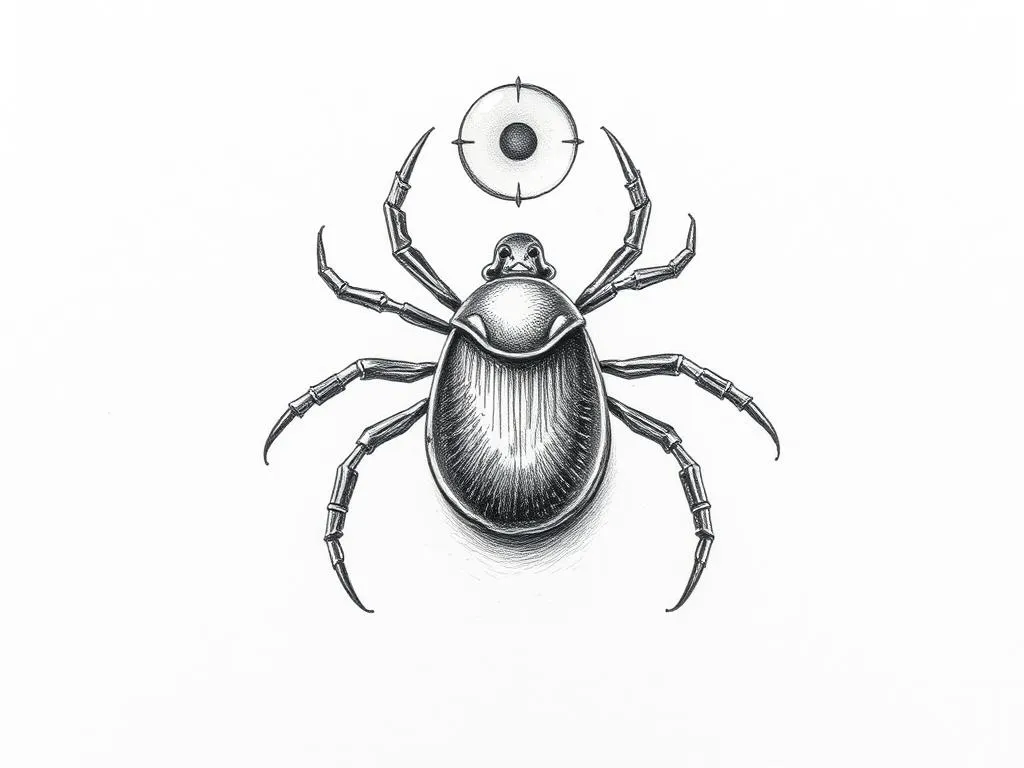The Hidden Symbolism of Ticks: Nature’s Tiny Parasitic Messengers

Disclaimer: Some images on this website are AI-generated artworks and may not accurately represent real animals.
Ticks, often viewed with disdain due to their parasitic nature, carry a symbolism and meaning that delve deeper than their role as mere pests. Understanding the tick symbolism and meaning allows us to explore their place in nature and within our own experiences. This post will uncover the biological characteristics of ticks, cultural perceptions, their spiritual meanings, and even their representation in dreams and modern contexts.
Understanding the Tick
Biological Characteristics
Ticks belong to the arachnid family, which makes them distant relatives of spiders. They are small, blood-sucking parasites that can be found in various environments across the globe, thriving in forests, grasslands, and even urban areas. The tick’s life cycle comprises four stages: egg, larva, nymph, and adult. Each stage requires a blood meal to progress, which is a fascinating aspect of their biology.
| Life Cycle Stage | Description | Duration |
|---|---|---|
| Egg | Laid in clusters, hatching into larvae | Late spring to early summer |
| Larva | Six-legged and seeks its first blood meal | A few days to weeks |
| Nymph | Eight-legged, seeks a second meal | Several months |
| Adult | Fully developed, seeks a blood meal to reproduce | Up to two years |
The differences between tick species, such as the deer tick and the dog tick, can have significant implications for their behavior and the diseases they transmit. Ticks play a crucial role in the ecosystem, acting as both predators and prey. They help control rodent populations and serve as food for birds and other wildlife.
Cultural Perceptions
Ticks have been perceived differently across cultures and throughout history. In some societies, they have been seen as symbols of disease and decay due to their association with illnesses such as Lyme disease. Conversely, in other cultures, ticks may symbolize survival, given their ability to thrive in harsh conditions.
Common myths about ticks often exaggerate their dangers or attribute supernatural qualities to them. Understanding these cultural perceptions can help demystify ticks and highlight the lessons they bring regarding resilience and survival.

Symbolism & Spiritual Meaning
Survival and Resilience
The tick’s ability to survive in various environments is a powerful symbol of resilience. Their capacity to endure harsh conditions, coupled with their tenacity to attach themselves to hosts, can inspire us to cultivate similar traits in our lives. Ticks remind us that survival often requires adaptability and unwavering determination.
Life, like the tick’s journey, can be filled with obstacles. By observing the tick’s behavior, we can learn valuable lessons about overcoming adversity and embracing our own strength.
Transformation and Change
The life cycle of the tick serves as a profound metaphor for transformation and change. Each stage represents a significant shift, illustrating how growth often comes through challenges. Just as ticks must shed their skin and adapt, we too must embrace change to evolve.
The tick’s life cycle encourages us to reflect on our personal journeys, acknowledging that growth often arises from discomfort and struggle. By embracing the lessons of transformation, we can navigate our own life’s changes with grace and resilience.
Attachment and Dependency
Ticks are often associated with the symbolism of attachment in relationships. Their parasitic nature can represent the balance between connection and codependency. While healthy relationships can foster growth and support, unhealthy attachments can lead to detrimental dependency.
Understanding this duality can help us navigate our connections with others, reminding us of the importance of maintaining personal autonomy while fostering meaningful relationships. The tick’s presence in our lives can serve as a reminder to cultivate healthy boundaries.
Ticks in Dreams
Common Dream Scenarios
Dreaming of ticks can evoke feelings of discomfort and anxiety, often leading to various interpretations. Common scenarios include being bitten by a tick, discovering ticks on one’s body, or witnessing an infestation. Each of these dreams can reflect different aspects of our waking life.
| Dream Scenario | Possible Meaning |
|---|---|
| Being bitten | Feeling threatened or violated in waking life |
| Discovering ticks | Uncovering hidden fears or anxieties |
| Infestation | Feeling overwhelmed by stress or negative influences |
Understanding the significance of these dreams can provide insight into our emotional state. Ticks in dreams may symbolize underlying stressors or unresolved issues, encouraging us to confront our fears and insecurities.
Psychological Insights
Ticks can often represent anxiety or stress in our lives. Their parasitic nature may mirror feelings of being drained or overwhelmed by external pressures. By interpreting ticks in our dreams, we can uncover deeper psychological insights and explore what may be lurking beneath the surface of our consciousness.
Through this lens, the tick becomes a symbolic representation of our struggles, urging us to confront and address our anxieties. By recognizing these patterns, we can work towards personal growth and healing.
Modern Interpretations
Tick Symbolism in Pop Culture
In contemporary culture, ticks have found their way into literature, media, and discussions about health. They often serve as metaphors for deeper societal issues, such as the struggle against illness, the impact of environmental changes, or the complexities of human relationships.
In various forms of storytelling, ticks can symbolize the unseen burdens we carry, highlighting the importance of addressing these challenges. Their presence in pop culture encourages us to reflect on our own experiences and the broader implications of our relationships with nature and one another.
Environmental Awareness
Ticks are becoming increasingly relevant in discussions about climate change and biodiversity. As indicators of ecological health, ticks can signal shifts in environmental conditions. Their populations can reflect changes in wildlife habitats and the impacts of climate change on ecosystems.
By understanding the role of ticks within these discussions, we can foster a greater awareness of our environment. Ticks serve as reminders of the intricate connections between all living beings and the importance of preserving biodiversity.
Key Takeaways
- The tick symbolizes resilience and survival, reminding us of the strength found in adaptability.
- Their life cycle represents transformation and change, encouraging personal growth through adversity.
- Ticks highlight the balance between attachment and dependency, urging us to cultivate healthy relationships.
- In dreams, ticks can reflect underlying anxieties, helping us to confront our fears and insecurities.
- Their presence in modern culture serves as a metaphor for societal issues, emphasizing the importance of awareness and understanding.
Conclusion
The significance of ticks as symbols extends far beyond their physical presence in nature. By exploring their symbolism and meaning, we uncover valuable lessons about resilience, transformation, and awareness. Ticks remind us that even the smallest creatures can carry profound messages about life’s complexities, urging us to embrace the lessons they offer.
Throughout history, culture, and our personal experiences, ticks serve as tiny messengers that prompt us to reflect on our relationships, confront our fears, and recognize the resilience that lies within us all. Embracing these lessons can lead to a deeper understanding of ourselves and the world around us.







